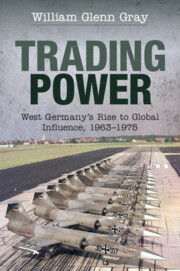Refine search
Actions for selected content:
2 results
Introduction
-
- Book:
- Trading Power
- Published online:
- 14 October 2022
- Print publication:
- 03 November 2022, pp 1-11
-
- Chapter
- Export citation

Trading Power
- West Germany's Rise to Global Influence, 1963–1975
-
- Published online:
- 14 October 2022
- Print publication:
- 03 November 2022
